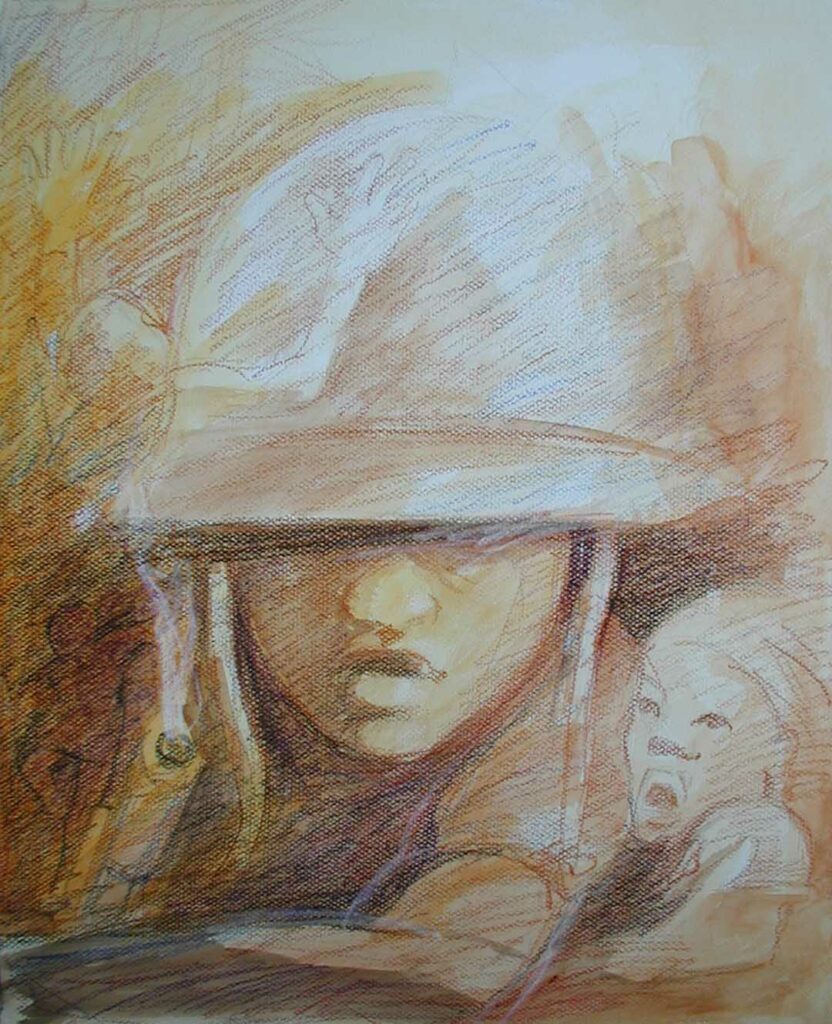This Saturday, January 11, is Human Trafficking Awareness Day. Human trafficking is modern-day slavery – the recruitment, harboring, transporting, providing or obtaining by any means any person for forced labor, slavery or servitude in any industry or site such as agriculture, construction, prostitution, manufacturing, begging, domestic service or marriage. The International Labor Organization (ILO) — the United Nations agency charged with addressing labor standards, employment and social protection issues — estimates that there are 12.3 million people in forced labor, bonded labor, forced child labor and sexual servitude at any given time; other estimates range from 4 million to 27 million. (Trafficking in Persons Report, U.S. Department of State, 2008). (From the PCUSA Human Trafficking Roundtable)
As disciples of Jesus Christ, we follow God into a world in need of healing to participate in God’s ministry of love, justice, and reconciliation. Below are some resources from the Presbyterian Church (U.S.A.) on how we as Christians can respond to the reality of modern-day slavery through our worship, reflection, and action.
Resources for Worship
Liturgical resources by Teresa Lockhart Stricklen, Associate for Worship, Office of Theology and Worship, with input from members of the Human Trafficking Roundtable
Scripture to Consider
- Leviticus 25
The prophets assure us of God’s saving action amidst exile and oppression which invite our response:
- Isaiah 40:1-5, 27-31
- Isaiah 51:11
- Isaiah 61:1-4
- Isaiah 65:17-32
- Jeremiah 6:13-15
- Micah 6:3-8
Jesus renews God’s covenant, exhorting us to love God and neighbor:
- Matthew 5:1-16
- Matthew 22:34-40
- Luke 4:16-20
- John 15:12-17
The apostle Paul encourages followers of Jesus to show loving kindness and respect to all:
- Romans 12:9-21
- Galatians 3:27-29
James and John remind us that our faith must be lived out and that we should not fear:
- James 2:14-26
- 1 John 4:16b-21
- James 5:1-6
Liturgy
Reader’s Theater Liturgy lifting up the voices of trafficked persons (pg. 2-4)
Eternal God, our judge and redeemer,
we confess that we have tried to hide from you,
for we have done wrong.
We have lived for ourselves,
and apart from you.
We have turned from our neighbors,
and refused to bear the burdens of others.
We have ignored the pain of the world,
and passed by the hungry, the poor, and the oppressed.
In your great mercy forgive our sins
and free us from selfishness,
that we may choose your will
and obey your commandments;
through Jesus Christ our Savior. Amen.
Assurance of Pardon (from Exodus 3:7-8):
One: Then the Lord said, “I have seen the misery of the people in bondage,
I have heard their cries under the taskmasters.
Indeed, I know their suffering,
And I have come to deliver them.”
The Lord has sent you to proclaim release to the captives.
Many: In the name of Jesus Christ,
We are set free, free to love, free to serve, free to set others free. Thanks be to God!
Children’s Sermon:
A children’s sermon could invite children to think about what it would be like to be locked up in a room, forced to work all day, then chained to a bed at night, only to be let out to work some more. While we don’t want to paint the scenario too graphically so as to scare small children to death, older children can be engaged in a conversation about the problem of human trafficking. Once they’ve got the idea of what it might be like to be a child laborer, ask them why we should care about children who are forced to work all the time someplace far away. Why should the church care? The answer, of course, is that God wants us to be free. God sets captives free. Why is slavery wrong? Here you can teach from the Heidelberg Catechism: “In life and in death, I belong to God.” We belong to God, not to any other person–not even our parents.
Minute for Mission:
Invisibly, a young girl’s family is given wages that she will have to earn with her body. One of many, she is taken away from her home by boat to a destination unknown. A mother quietly weeps, pulling her luggage through an airport. She is uncertain of her return or reuniting with her family. She is now one of the many so-called Overseas Filipino Workers. In a rural village, a boy old enough to work in the sugarcane fields is fortunate that his family is able to send him to school. While at school, he is recruited for a job in the city that will make him more money than in the fields. Now living and working in a building that is locked and monitored, though, he climbs through an open window on to a mango tree and waits for 6 hours hoping to escape. Free from the building, he is lost, alone, and without money or connections.
A joint ministry of the National Council and the United Church of Christ in the Philippines, Teatro Ekumenikal is theater group of youth and young adults who are a strong voice for justice. The group crafted a visual worship reflection that centered on making the invisible experiences of human trafficking and modern day slavery visible for the participants on the February 2013 Peacemaking Travel Study Seminar Trip to the Philippines. “God or Gold” highlighted the challenge for the church in addressing the overwhelming poverty and violence in the Philippines.
The Peacemaking Offering supports the peacemaking ministries of the Presbyterian Church (U.S.A.)’s congregations, nationally and globally. Travel Study Seminar experiences and International Peacemaker visits help spread stories of peacemaking and ways to engage in this practice. As we gather this day, let us remember our neighbors and partners who help us to see both the visible and the invisible, transforming cultures of greed and violence into communities of peace.
Let us pray
O, God help us to seek a peace that is deeper than fear and to hold our neighbors in the light of peace. Amen.
 Prayer Concerning Human Trafficking
Prayer Concerning Human Trafficking
Loving God, you created us in love for life together. And yet we have turned away from you and from our neighbor. As we remember the women, children and men who have been trafficked for profit, production and pleasure, we realize we know little about the circumstances under which our food, our clothing, our jewelry, our lumber or our toys have been produced. And we confess that there is a part of us that would rather not know. People harvest crops, serve us food, clean our homes and yards, paint our nails, service our hotel rooms; but we confess that too often we reduce them to the service they provide and so they remain hidden in plain sight. Children here and around the world are sold, pimped, and forced to labor out of desperation, for the comfort or convenience of those who can pay. We are ill at the thought and ill-equipped to respond. Forgive us God. And help us join with our sisters and brothers who have been trafficked to create life-giving patterns of community and commerce. We ask this in the name of Jesus Christ, who came that we might have life in all its fullness. Amen.
-By Rev. Noelle Damico, Associate for Fair Food, Presbyterian Hunger Program
Charge and Benediction (from Gal. 5:1):
It was for freedom that Christ set us free–not just for our freedom, but for all people’s. Therefore keep standing firm and do not allow slavery to be master over anyone ever again. May God who created all for good, Christ who liberated all, and the Holy Spirit who empowers and guides us into all truth overshadow and keep you in God’s glory, wisdom, and power now and forevermore. Amen.
Bulletin Insert about Human Trafficking (from the PCUSA Human Trafficking Roundtable)
Appropriate Hymns from our Presbyterian Hymnals
 PH=The Presbyterian Hymnal (1990)
PH=The Presbyterian Hymnal (1990)GtG=Glory to God (2013)
O For a Thousand Tongues to Sing (PH # 466, GtG #610)
O for a World (PH #386, GtG #372)
Live into Hope (PH #332, GtG #772)
O Day of Peace (PH #450, GtG #373)
Today We All Are Called to Be Disciples (PH #434, GtG #757)
Sacred the Body (GtG 27)
These resources and many others can be found at http://www.presbyterianmission.org/ministries/human-trafficking/.
Resources for Reflection
- Learn about what products of slavery are produced by child and slave labor in different parts of the world through this interactive website from Anti-Slavery International. Calculate your “slavery footprint.”
- Read the Reflection on Human Trafficking Awareness from the 2014 PC(USA) Mission Yearbook by Rev. Noelle Damico
- Read this theological and biblical reflection on Human Trafficking: “Let My People Go” by Thelma Burgonia-Watson, Horizons Magazine (March/April 2010)
- Explore the following General Assembly policy concerning human trafficking and modern-day slavery: A Resolution to Expand the Church’s Ministry with and Advocacy Against Human Trafficking (2008), On Preventing the Trafficking of Women, Internationally and Nationally (2008), On Condemning International Trafficking in and Sexual Exploitation of Children (2006), Resolution in Support of Ongoing Partnership Work with the Coalition of Immokalee Workers and the Campaign for Fair Food (2006).
Resources for Action
- A Toolkit for Action: Modern Slavery (resource from the PCUSA Human Trafficking Roundtable)
- Take Action with the PCUSA Human Trafficking Roundtable
- Freedom Network USA
- ECPAT USA
- Coalition of Immokalee Workers
- United Nations Global Initiative to Fight Trafficking (UN GIFT)
- Red Hand’s Campaign
- Code of Conduct for the Protection of Children from Sexual Exploitation in Travel and Tourism












Pingback: January 11 is Human Trafficking Awareness Day « World Day of Prayer USA
Pingback: Resources for Human Trafficking Awareness Day |...